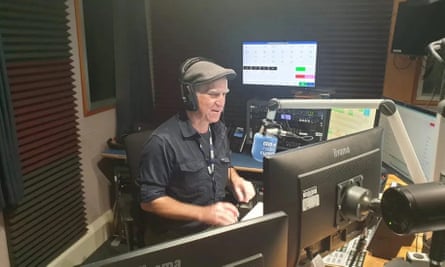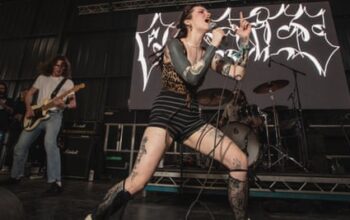In the early 2000s, trudging through the static of mainstream radio, I stumbled upon RTÉ Raidió na Gaeltachta, the Irish-language outpost of Ireland’s national broadcaster – and a programme that flipped the script on radio as I knew it. Presented by Cian Ó Cíobháin from the Atlantic-hugging west Kerry coast, a fair stretch from my home in rural Northern Ireland, An Taobh Tuathail (“The Other Side”) still feels like a portal to a far-flung realm.
Broadcast every weekday since May 1999, Ó Cíobháin expertly blends leftfield music: it has championed ambient and electronic pioneers such as Mexican composer Murcof and the late Japanese musician Susumu Yokota, and spotlighted the curveballing instrumentalism of Irish artists including cellist Eimear Reidy and revered Limerick producer Naive Ted. Super Furry Animals frontman Gruff Rhys is one of many artists to have hailed An Taobh Tuathail’s influence, calling it “one of the most radical radio shows in the world”.
Unlike its flagship station Radio 1, RTÉ upheld a ban on playing songs in English on Raidió na Gaeltachta until 2005, with Ó Cíobháin navigating the restriction by presenting in Irish while predominantly playing instrumental music, spanning post-rock, electronica, jazz, techno, and more.
While the ban has since been lifted, allowing for the inclusion of anglophone music over the past two decades, there’s something in the music of the Irish tongue that continues to cast its own spell. Like countless other regular listeners with only cúpla focal (or “a few words”), straining my ear has only deepened the appreciation.
“Listeners have messaged me to tell me that the programme is their sole connection with the Irish language,” says Ó Cíobháin. “It’s a lovely thing to hear: that were it not for the show, thousands of people around the world might never hear our beautiful, ancient language.”
“I’m aware that most listeners don’t speak the language, so I keep chat to a minimum,” he adds. “I tell you what record I played and what’s up next. Listeners who don’t speak the language have contacted me over the years to tell me how they find it quite comforting to tune in and hear me speak, even if they might not understand everything I say.”
As it celebrates a quarter of a century of quietly kicking against convention, An Taobh Tuathail is a reminder of how dedicated and impassioned radio presenters can unlock new musical worlds – even if you don’t speak their language. Here are some other cult programmes from around Europe to discover.
Klaus Fiehe

In 1994, five years before An Taobh Tuathail took to the airwaves, Klaus Fiehe embarked on his own journey toward earning the title “the German John Peel”: his program, 1Live Fiehe, broadcast by Cologne public radio station Westdeutscher Rundfunk (WDR), showcases a presenter who has always marched to the beat of his own drum.
Fiehe’s career began in the early 1980s as a saxophonist for the alternative rock icons Geier Sturzflug, and his three-hour weekly show, drawing from a personal collection of over 60,000 records, reveals his peerless curation, insatiable spirit and storytelling flair within German pop culture. The Peel parallel holds up. And while preferring to be known as “that guy who spins the right stuff”, it’s Fiehe’s mastery at waxing poetic auf Deutsch that props up this inimitable show.
Rhys Mwyn

The bassist in the politically outspoken Welsh punk-rock group Anhrefn (or “Chaos”) in the 1980s and 1990s is now a tour guide and respected archaeologist, and his BBC radio show is a veritable trove, too. Largely presented in Welsh, Recordiau Rhys Mwyn (“Rhys Mwyn’s Records”) offers a sublime blend of lesser-heard music and guest reminiscences of the era when his old band extensively toured Europe.
However, it’s not purely nostalgic. Alongside disco, punk, electronica and more, Mwyn’s dedication to featuring numerous contemporary artists, many hailing from Wales, seals its appeal. He occasionally switches to English to benefit English-speaking guests, making the return to the melodious and distinct Welsh language a wonderful payoff.
Grażyna Biedroń

Taking inspiration from the likes of Lyl Radio in Lyon and Tallinn’s Ida, Radio Kapitał in Warsaw has stepped up to meet the demand in Poland.
One DJ shaping its identity is Grażyna Biedroń, who debuted in August 2023. Every other Tuesday morning, she guides listeners through electronic genres from breakbeat to acid house, with themed episodes and a seamless blend of Polish and international sounds: “An immersion in underground flavours within the realm of electronic music, with a shared thread that sparks conversations,” she says.
Source: theguardian.com


